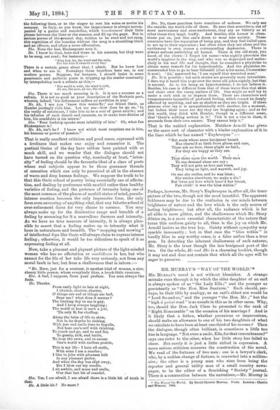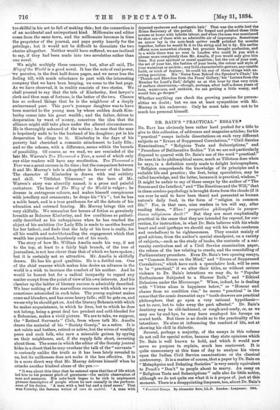MR. MURRAY'S "WAY OF THE WORLD."*
Ma. MURRAY'S novel is not without blemishes. A strange mistake runs through it by which the elder daughter of an earl is always spoken of as "the Lady Ella;" and the younger as persistently as "the Hon. Miss Santerre." Such should, per- haps, be their title by analogy, as an earl's eldest son would be "Lord So-and-so," and the younger "the Hon. Mr. ;" but the "high it priori road" is as unsafe in this as in other cases. Why,. too, should the Hon. Jack Clare be promoted to the rank of "Right Honourable" on the occasion of his marriage ? And is- it likely that a father, whether pecunious or impecunious, should make an allowance to one of his two daughters of what we calculate to have been at least one-third of his income? Then, the dialogue, though often brilliant, is sometimes a little too- fine in language. "Not even a smile, Ella, for that remembrance?' says one sister to the other, when her little story has failed to, cheer. But surely it is just a little stilted in expression. A more serious criticism concerns the construction of the novel. We read of the fortunes of two men : one is a lawyer's clerk, who, by a sudden change of fortune, is converted into a million- aire ; the other is a young man who rises from being the reporter and general utility man of a small country news- paper, to be the editor of a flourishing " Society " journal. There is a connnection between the narratives,—Mr. Murray is
• The Wolof the World. By David Christie Murray. 3 sous. London: Matto and Windus. 18S4.
too skilful in his art to fail of making this ; but the connection is -of an accidental and unimportant kind. Millionaire and editor come from the same town, and the millionaire becomes in time the proprietor of the journal, and pays pretty heavily for the privilege ; but it would not be difficult to dissociate the two stories altogether. Neither would have suffered, we are inclined to say, if they had been made into two novelettes rather than one novel.
We might multiply these censures ; but, after all said, The Fay of the World is a good novel. It has the note of real power, /we perceive, in the first half-dozen pages, and we never lose the feeling till, with much reluctance to part with the interesting company that we have been keeping, we come to the last page. As we have observed, it in reality consists of two stories. We shall proceed to say that the tale of Kimberley, first lawyer's clerk and then man of fortune, is the better of the two. Chance has so ordered things that he is the neighbour of a deeply embarrassed peer. This peer's younger daughter was to have been married to the young man by whose sudden death Kim- berley comes into his great wealth ; and the father, driven to desperation by want of money, conceives the idea that the alliance might still take place under the altered circumstances. He is thoroughly ashamed of the notion ; he sees that the man is hopelessly unfit to be the husband of his daughter; yet in his desperation he clings to it. Kimberley in the days of his poverty had cherished a romantic attachment to Lady Ella ; and so the scheme, with a difference, seems within the bounds of possibility. Of course, as we read, we are reminded of the late Mr. Warren's Ten Thousand a Year, a novel of which only our elder readers will have any recollection. Ten Thousand a Year was a great success in its time ; but the comparison between it and Mr. Murray's tale is altogether in favour of the latter. The character of Kimberley is drawn with real subtlety and skill. " Tittlebat Titmouse," as the hero of Mr. Warren's story was absurdly named, is a gross and painful caricature. The hero of The Way of the World is vulgar ; he dresses in outrageous colours, and makes himself conspicuous with jewellery and ornaments ; he drops his " h's " ; but he has a noble heart, and is a true gentleman for all the defects of his education and outward bearing. Mr. Murray brings this out very skilfully. We remember few heroes of fiction so genuinely loveable as Bolsover Kimberley, and few conditions so patheti- cally described as his unhappiness when he has reached the object of his ambition (for Lady Ella is made to sacrifice herself 'for her father), and finds that the lady of his love is really, for all his wealth and notwithstanding the engagement which that wealth has purchased, hopelessly out of his reach.
The story of how Mr. William Amelia made his way, if not to the top, at least to a fairly high branch, of the tree of journalism, is nut less clever than that of which we have spoken ; but it is certainly not so attractive. Mr. Amelia is skilfully drawn. He has his good qualities. He is a dutiful son. One of the chief reasons which makes him desire an advance in the world is a wish to increase the comfort of his mother. And he would be honest but for a radical incapacity to regard any matter except from the point of view of his own interests. And his -clamber up the ladder of literary success is admirably described. We hear nothing of the marvellous successes with which we are sometimes astonished in such tales. The young aspirant makes some sad blunders, and has some heavy falls ; still he gets on, and we see why he should get on. And the literary Bohemia with which he makes acquaintance, in which he lives, but to which he does not belong, being a great deal too prudent and cold-blooded for a Bohemian, makes a vivid picture. We are to take, we suppose, the "Retired Suvvants " Club, from whose talk Mr. Amelia -draws the material of his "Society Gossip," as a satire. It is not valets and butlers, retired or active, but the wives of wealthy peers and such folk, who earn a miserable guinea by spying on their neighbours, and, if the supply falls short, inventing about them. The scene in which the editor of the Society journal hides in a closet that he may overhear the talk of the" suvvants " is curiously unlike the truth as it has been lately revealed to us, but its unlikeness does not make it the less effective. It is in a more direct way that Mr. Murray delivers himself when he -attacks another kindred abuse of the pen :—
" It was about this time that he entered upon that line of life which led him to his present pitch of greatness—the satiric observation of men and manners. His note-book began to be rich in unpleasant phrases descriptive of people whom he saw casually in the perform- .ance of his duties. A man with a bad hat and a tired sneer.' That was Formby, the famous writer of vers de societe. 'A man with dejected eyebrows and apologetic hair.' That was the noble lord the Home Secretary of the period. He forged and polished these little arrows at home with infinite labour, and when the man was mentioned he shot one of them with an admirable air of impromptu. Sometimes an arrow lay in the note-book quiver read, polished for months together, before he would fit it to the string and let it fly. His earlier efforts were somewhat clumsy, but practice brought perfection, and in a while there was no man in London who could fit you with a phrase more completely than Mr. Amelia, if you would only give him time. Not your spiritual or moral qualities ; but the cat of your coat, the set of your hat, the fashion of your boots, the colour and style of your waistcoat or necktie ; any little characteristic gesture, any outside habit, or trick of feature ; he could hit any of these things with un- erring precision. His Notes from Behind the Speaker's Chair,' his Thumb-nail Sketches from the Peers' Gallery,' his Letters from the Member for Land's End,' delight us at this hour by that very trick of surface observation,—though, perhaps, after half-a-dozen years of hats, waistcoats, and neckties, we are getting a little weary, and would fain go deeper."
Whether anything can check the growing passion for person- alities we doubt ; but we can at least sympathise with Mr. Murray in his endeavour. Only he must take care not to be much too personal himself.



































 Previous page
Previous page